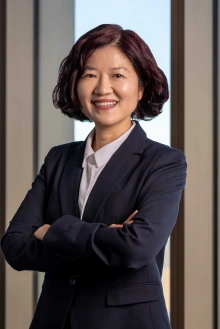Nursing’s Park accepted into pain group’s leadership academy
Juyoung Park, PhD, a University of Arizona College of Nursing professor and associate director of the college’s Brain Digital Technology Laboratory, was accepted into the United States Association for the Study of Pain Leadership Academy.
The yearlong program, which starts in April, aims to develop leaders in the field of pain research.

Juyoung Park, PhD
“As an Asian female faculty member, being selected for the Leadership Academy validates my efforts and provides a platform to advocate for equitable and innovative solutions for chronic pain,” said Park, a member of the U of A’s Comprehensive Center for Pain and Addiction and the BIO5 Institute. “It is a privilege to contribute to the academy’s mission and collaborate with like-minded professionals who are dedicated to advancing pain care.”
Park, a former clinical social worker, is an expert in chronic pain and nonpharmacological pain management for older adults with chronic conditions, such as Alzheimer’s disease and related dementias. She is also a Fellow of the Gerontological Society of America, which is dedicated to advancing research, education and practice in the field of aging.
“All of us at the College of Nursing are proud of Dr. Park for her dedication to easing the burden of chronic pain on patients everywhere,” said Brian Ahn, PhD, dean of the College of Nursing. “This recognition and opportunity with the Leadership Academy highlights our efforts to ensure a healthy future so all can advance and grow. Dr. Park’s work at the university makes her an integral part of our mission.”
Park said participating in the leadership program marks a significant milestone in her career and aligns with her goal of being a leader in nonpharmacological pain management and improving health outcomes for underserved populations.
In her nomination letter, Sheila M. Gephart, PhD, RN, FAAN, said Park’s dedication and innovative research make her an asset to the academy.
“I have no doubt that her leadership will continue to shape national guidelines and evidence-based policies for pain management,” Gephart wrote.
As part of the yearlong program, Park will work with a mentor and participate in regular peer-group meetings. The academy includes a capstone project. Park’s focuses on advancing telehealth-based nonpharmacological pain management. She is refining and piloting a scalable intervention that combines remotely-supervised transcranial direct current stimulation with remotely-supervised chair yoga to address chronic pain in older adults with Alzheimer’s disease and related dementias.
“This innovative project leverages telehealth to deliver remote care, addressing critical barriers faced by this population, including limited mobility, transportation challenges and inadequate access to health care services,” Park said.
Pain management in older adults with Alzheimer’s disease and related dementias is challenging for several reasons, Park said. For example, cognitive impairments can impede communications, which can lead to behavioral and psychological symptoms, like agitation and depression, that can be misunderstood or misattributed.
“A pivotal moment in my career was observing the struggles faced by caregivers and health-care professionals in recognizing and addressing pain in this population,” she said. “This experience highlighted the limitations of pharmacological treatments, which often carry significant risks, such as sedation or adverse side effects, in this vulnerable population. It became clear that innovative, nonpharmacological approaches were urgently needed to provide safe, effective and accessible pain management solutions.”
Park said she’s excited about the opportunity to grow as a leader and position her lab to be at the forefront of addressing chronic pain disparities and to drive change at the local and national level to ensure equitable access to effective pain care.

